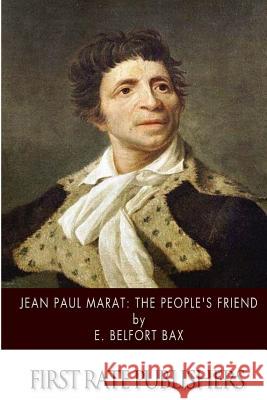Jean-Paul Marat: The People's Friend » książka
Jean-Paul Marat: The People's Friend
ISBN-13: 9781499792065 / Angielski / Miękka / 2014 / 128 str.
Ernest Belfort Bax (23 July 1854 - 26 November 1926) was a British socialist, journalist and philosopher. Born into a nonconformist religious family in Leamington, he was first introduced to Marxism while studying philosophy in Germany. He combined Karl Marx's ideas with those of Immanuel Kant, Arthur Schopenhauer and Eduard von Hartmann. Keen to explore possible metaphysical and ethical implications of socialism, he came to describe a "religion of socialism" as a means to overcome the dichotomy between the personal and the social, and also that between the cognitive and the emotional. He saw this as a replacement for organised religion, and was a fervent atheist, keen to free workers from what he saw as the moralism of the petty bourgeoisie. Almost throughout his life, he saw economic conditions as ripe for socialism, but felt this progress was delayed by a lack of education of the working class. Bax supported Karl Kautsky over Eduard Bernstein, but Kautsky had little time for what he saw as Bax's utopianism, and supported Theodore Rothstein's efforts to spread a more orthodox Marxism in the SDF. Initially very anti-nationalist, Bax came to support the British in World War I, but by this point he was concentrating on his career as a barrister and did little political work. Bax wrote a historical sketch of the life of Jean-Paul Marat (24 May 1743 - 13 July 1793), a Prussian-born physician, political theorist, and scientist best known for his career in France as a radical journalist and politician during the French Revolution. His journalism was renowned for its fiery character and uncompromising stance toward "enemies of the revolution" and basic reforms for the poorest members of society. Marat was one of the more extreme voices of the French Revolution, and he became a vigorous defender of the sans-culottes; he broadcast his views through impassioned public speaking, essay writing, and newspaper journalism, which carried his message throughout France. Marat's radical denunciations of counter-revolutionaries supported much of the violence that occurred during the wartime phases of the French Revolution. His constant persecution of "enemies of the people," consistent condemnatory message, and uncanny prophetic powers brought him the trust of the populace and made him their unofficial link to the radical Jacobin group that came to power in June 1793. For the two months leading up to the downfall of the Girondin faction in June, he was one of the three most important men in France, alongside Georges Danton and Maximilien Robespierre. He was murdered in his bathtub by Charlotte Corday.











